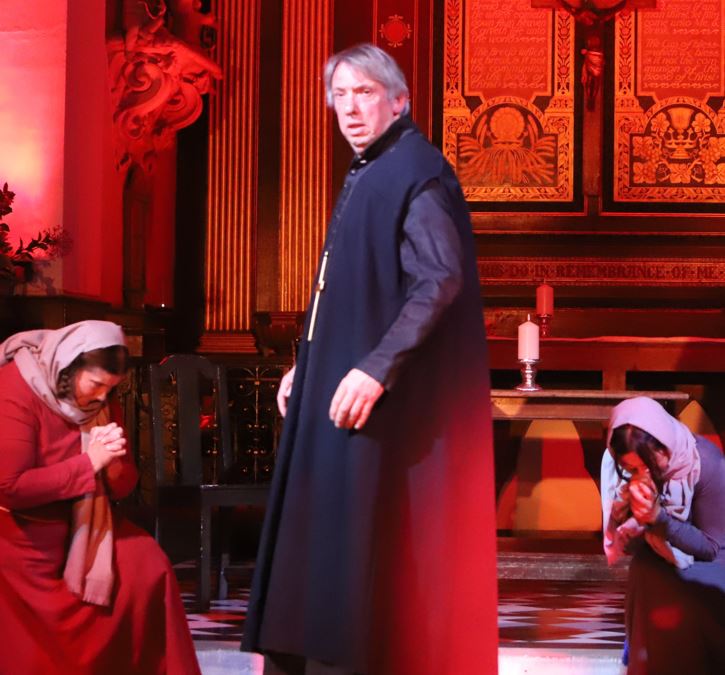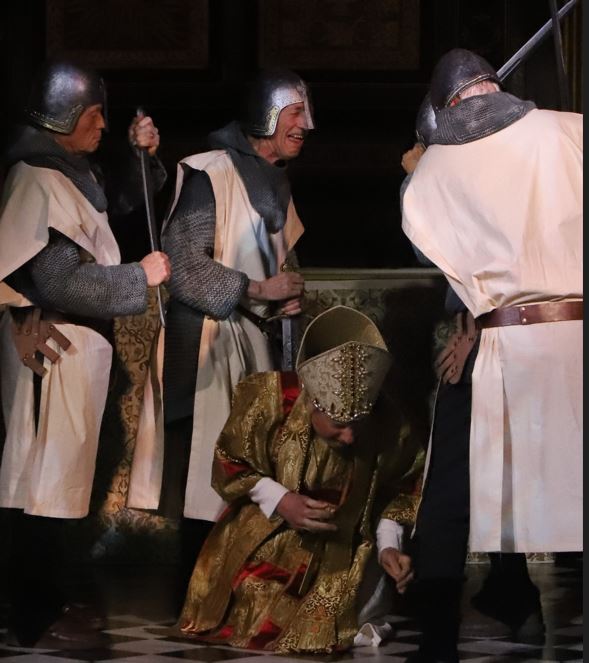Murder in the Cathedral
Internal Conflict and Unshakable Belief
Murder in the Cathedral
by T.S. Eliot
Richmond Shakespeare Society at St Mary’s Parish Church, Twickenham until 3rd June
Review by Brent Muirhouse
Any play that starts with a single supersonic scream at a pitch a common pipistrelle bat would be frightened by, is a play that immediately grabs attention. This is exactly the beginning of the Richmond Shakespeare Society’s staging of Murder in the Cathedral, T.S. Eliot’s play that explores the final days of Thomas Becket, the Archbishop of Canterbury, leading up to his assassination in Canterbury Cathedral in 1170.
After the ear-piercing shriek at its origin, the play delves into an equally uncomfortable power struggle between the secular and the spiritual, revolving around the political tensions between Becket and King Henry II. As Becket returns from exile in France, he knows he is walking into danger, but is determined to continue his duties as Archbishop, facing a series of temptations and confrontations by four visitors, as he chooses to defend the Church’s autonomy against the king’s perceived encroachment.

St. Mary’s Church in Twickenham provided a historical and eerily fitting backdrop for the performance. With much of the grandeur of a cathedral despite its stature as a diminutive architectural sibling, the church’s rich history dates back to medieval times, with its 15th century battlemented tower still standing today. This created an atmosphere that felt seemingly contemporary of Becket and Henry II (even with an interval where modernity returned with the checking of smartphones), the church’s décor and interior standing as a mirror of the central conflict of the play.
The cast admirably brought Eliot’s intricate and often heavy narrative to life, although the complexities of the dialogue occasionally caught them off-guard and slowed the pace of the performance. Nevertheless, the ensemble was unwavering in a determination which propelled the story to its conclusion, and the immersive setting more than compensated and swept the audience strikingly easily back to a time almost a thousand years prior.
Francis Abbott’s portrayal of Thomas Becket was a standout performance, capturing the character’s internal conflict and spiritual fervour, with stares into the distance those of a man possessed by something beyond realms of Earth and kings, to the pull of paradise beyond. The appropriately named Abbott powered through his extensive lines, aptly demonstrating Becket’s complete commitment to his faith and his unshakable belief in divine protection, even in the face of four sword-wielding visitors that act as tempters to bring him back to the riches of royalty. His performance acted as the central draw of the story, his speech and actions showing a kind of dreamlike abandon that Eliot portrays Becket as being held by, believing himself to be close to a god who will shield him from any king.
This was a performance of Murder in the Cathedral worthy of its setting at St. Mary’s Church, having captured the essence of T.S. Eliot’s play, in spite of the occasional challenges presented by its intricate narrative. The dedication of the cast, coupled with the profound historical relevance of the setting, made for an engaging and quite unique theatrical experience. After the curtain call, such was the apparent transportation to a different time and realm in a religious setting befitting of centuries before, I felt as if I’d programmed my Delorean to time-travel back to the present day, as I walked out into a modernised embankment of the River Thames and into the streetlights of suburbia.
Brent Muirhouse, June 2023
Photography by Simone Sutton




So wish I’d seen this production, even more so after having read this review. Unfortunately, tickets for the event sold out very quickly and I was a bit slow off the mark! But well done to all of the cast of this production: it was obviously very successful.